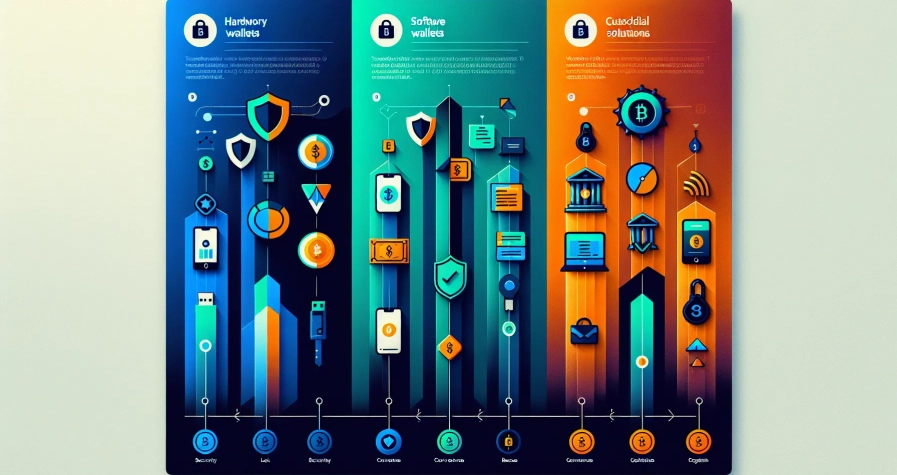You’ve probably heard the terms “crypto coins” and “crypto tokens” used interchangeably, but they’re actually quite different. Understanding this distinction is crucial if you’re looking to navigate the cryptocurrency landscape effectively or make informed investment decisions.
Crypto coins operate on their own blockchain networks and function as digital currencies. Think Bitcoin on the Bitcoin blockchain or Ethereum on the Ethereum network. Crypto tokens, however, are built on existing blockchains and represent various assets or utilities within specific projects.
This fundamental difference affects everything from how they’re created to their intended purpose and value proposition. Whether you’re a complete beginner or someone who’s been dabbling in crypto for a while, grasping these concepts will help you better evaluate different cryptocurrencies and understand what you’re actually buying when you invest in digital assets.
Understanding the Basics of Cryptocurrency
Cryptocurrency operates as decentralised digital money that uses cryptographic technology to secure transactions and control the creation of new units. Unlike traditional currencies controlled by central banks, cryptocurrencies function on distributed networks called blockchains that record all transactions across multiple computers.
Bitcoin emerged in 2009 as the first successful cryptocurrency, introducing the concept of peer-to-peer electronic cash without intermediaries. Since then, over 13,000 different cryptocurrencies have entered the market, each serving specific purposes and operating under unique protocols.
Blockchain technology forms the backbone of all cryptocurrencies by maintaining a permanent, tamper-proof ledger of transactions. Each block contains transaction data, timestamps, and cryptographic hashes that link it to the previous block, creating an unbreakable chain of records.
Key Characteristics of Cryptocurrencies
Cryptocurrencies share several fundamental properties that distinguish them from conventional financial systems:
- Decentralisation: No single authority controls the network or monetary policy
- Transparency: All transactions are publicly visible on the blockchain
- Immutability: Confirmed transactions cannot be reversed or altered
- Pseudonymity: Users interact through wallet addresses rather than personal identities
- Global accessibility: Anyone with internet access can participate in the network
How Cryptocurrencies Function
Mining or validation processes create new cryptocurrency units whilst simultaneously securing the network. Proof-of-Work systems like Bitcoin require miners to solve complex mathematical puzzles, whilst Proof-of-Stake networks allow validators to process transactions based on their stake in the network.
Digital wallets store your cryptocurrency holdings through private and public key pairs. Your public key serves as your address for receiving funds, whilst your private key acts as your digital signature for authorising transactions.
Smart contracts enable programmable money by automatically executing agreements when predetermined conditions are met. Ethereum pioneered this functionality in 2015, allowing developers to build decentralised applications and create new types of digital assets.
What Are Crypto Coins?
Crypto coins are digital currencies that operate on their own independent blockchains and primarily serve as a medium of exchange or store of value. You can distinguish coins from tokens because they have their own blockchain infrastructure, consensus mechanisms, and native protocols that enable autonomous function within their network.
Key Characteristics of Coins
Understanding crypto coin characteristics helps you identify them in the cryptocurrency market. These digital assets possess specific features that differentiate them from other cryptocurrency types.
Independent blockchain operation forms the foundation of crypto coins. You encounter coins that run on their own dedicated blockchain networks rather than existing on other platforms. This independence provides coins with complete control over their network protocols and governance structures.
Native currency functionality defines how you use crypto coins within their ecosystems. These coins serve as digital money that enables value transfer, transaction fee payments, and value storage. You can utilise them for everyday transactions and long-term wealth preservation.
Consensus mechanism integration secures crypto coin networks through various validation processes. You find coins employing Proof of Work (PoW) systems like Bitcoin or Proof of Stake (PoS) mechanisms like Ethereum 2.0. These systems require mining or staking processes to create new coins and validate transactions.
Network security provision represents a crucial coin characteristic. You participate in network security when holding and staking certain coins, contributing to blockchain integrity and earning rewards for your participation.
Popular Examples of Crypto Coins
Examining established crypto coins demonstrates the diversity and functionality of these digital assets. You can observe different approaches to blockchain technology and cryptocurrency implementation through these examples.
| Coin | Blockchain | Consensus | Primary Use Case | Market Cap Rank |
|---|---|---|---|---|
| Bitcoin (BTC) | Bitcoin | Proof of Work | Digital gold, store of value | #1 |
| Ethereum (ETH) | Ethereum | Proof of Stake | Smart contracts, dApps | #2 |
| Cardano (ADA) | Cardano | Proof of Stake | Scalable blockchain platform | Top 10 |
Bitcoin (BTC) operates as the first and most recognised cryptocurrency. You can use Bitcoin as digital gold for value storage and peer-to-peer transactions without intermediaries. The Bitcoin blockchain processes approximately 7 transactions per second and has maintained 99.98% uptime since its 2009 launch.
Ethereum (ETH) functions as the native coin of the Ethereum blockchain. You utilise ETH to pay transaction fees (gas fees) and interact with smart contracts and decentralised applications. Ethereum processes around 15 transactions per second and hosts over 3,000 decentralised applications.
Cardano (ADA) represents a third-generation blockchain focusing on sustainability and scalability. You can stake ADA to participate in network consensus and earn rewards while supporting blockchain security. Cardano’s Ouroboros protocol processes up to 1,000 transactions per second with minimal energy consumption.
What Are Crypto Tokens?
Crypto tokens are digital assets created on existing blockchain networks using smart contracts rather than operating on their own independent blockchains. You’ll find tokens built on established platforms like Ethereum or Tron, where they leverage the underlying infrastructure to provide specific utilities within project ecosystems.
Key Characteristics of Tokens
Built on existing blockchains: Tokens utilise established blockchain platforms like Ethereum through smart contract technology. You don’t see tokens operating independently since they depend entirely on their host blockchain’s infrastructure for functionality and security.
Versatile functionalities: Tokens serve multiple purposes beyond simple transactions. Governance tokens grant voting rights in decentralised protocols, utility tokens provide access to specific services or products, and security tokens represent traditional financial instruments in digital form.
Developer-controlled creation: Project teams mint and distribute tokens according to predetermined rules rather than through mining processes. You’ll typically see tokens allocated through initial coin offerings, airdrops, or gradual release schedules managed by smart contracts.
Interoperability advantages: Multiple token projects can coexist on a single blockchain platform and interact seamlessly. You can trade, swap, or combine different tokens within the same ecosystem using standardised protocols like ERC-20 on Ethereum.
Project-specific usage: Tokens operate within particular decentralised applications or ecosystems rather than functioning as general-purpose currency. You’ll find tokens designed for specific platforms like gaming environments, decentralised finance protocols, or content creation networks.
Popular Examples of Crypto Tokens
| Token Name | Symbol | Type | Primary Function |
|---|---|---|---|
| Uniswap | UNI | Governance | Voting rights in decentralised exchange |
| Basic Attention Token | BAT | Utility | Browser ecosystem rewards |
| Tether | USDT | Stablecoin | US dollar-pegged value storage |
| CryptoKitties | – | NFT | Digital collectible ownership |
Uniswap (UNI): This governance token grants you voting rights within the Uniswap decentralised exchange protocol. UNI holders participate in decision-making processes affecting platform upgrades, fee structures, and treasury management.
Basic Attention Token (BAT): You’ll encounter BAT within the Brave browser ecosystem where it facilitates advertising rewards and content creator payments. Users earn BAT for viewing privacy-respecting advertisements and can tip their favourite content creators.
Tether (USDT): This stablecoin token maintains a 1:1 peg with the US dollar across multiple blockchain networks. You can use USDT for trading, remittances, and value storage without experiencing the volatility typical of other cryptocurrencies.
Non-fungible tokens (NFTs): Digital collectibles like CryptoKitties represent unique assets with distinct characteristics and ownership records. You can collect, trade, and breed these digital assets while maintaining verifiable ownership through blockchain technology.
Crypto Tokens vs Coins: Key Differences
Understanding the fundamental distinctions between crypto coins and tokens helps you navigate the cryptocurrency landscape more effectively. These differences span technical architecture, functional purposes and creation processes.
Technical Infrastructure
Coins operate as native digital currencies on their own independent blockchain networks. Bitcoin runs exclusively on the Bitcoin blockchain whilst Ethereum operates on its dedicated Ethereum network. Each coin maintains complete control over its blockchain infrastructure including security protocols, consensus mechanisms and network governance.
Tokens exist on established blockchain platforms without owning the underlying infrastructure. Ethereum hosts thousands of tokens through its smart contract functionality, with Tron and Binance Smart Chain serving as popular alternatives. Your token transactions rely entirely on the host blockchain’s technical capabilities and security measures.
| Infrastructure Type | Blockchain Ownership | Network Dependency | Security Source |
|---|---|---|---|
| Coins | Independent | Self-maintained | Native consensus |
| Tokens | Host blockchain | Platform-dependent | Host network |
Purpose and Functionality
Coins function primarily as digital money for transactions, value storage and network fee payments. You use Bitcoin for peer-to-peer transfers, Ether for Ethereum transaction fees and Cardano for staking rewards. Coins incentivise network validators through mining rewards or staking distributions, maintaining blockchain security.
Tokens serve diverse purposes beyond basic currency functions. Utility tokens grant access to specific services or gaming platforms, governance tokens provide voting rights on protocol changes and security tokens represent traditional financial instruments. NFTs demonstrate token uniqueness by representing digital art, collectibles or virtual real estate ownership.
Creation and Distribution Methods
Coins generate through mining processes where validators solve cryptographic puzzles or staking mechanisms where holders secure the network. Creating new coins requires building complete blockchain infrastructure from scratch, demanding significant technical expertise and computational resources. Bitcoin miners receive newly minted coins for validating transactions whilst Ethereum validators earn staking rewards.
Tokens mint via smart contracts deployed on existing blockchains, making creation substantially easier and cheaper than coin development. Project teams distribute tokens through initial coin offerings, airdrops or direct sales without requiring independent blockchain construction. Multiple tokens operate simultaneously on single blockchain platforms, each programmed with distinct features and utilities.
Types of Crypto Tokens
Crypto tokens fall into three distinct categories based on their primary function within blockchain ecosystems. Each type serves specific purposes and offers different benefits to holders.
Utility Tokens
Utility tokens provide you with access to products or services within a particular platform’s ecosystem. These tokens function as digital keys that unlock features, facilitate transactions, or grant usage rights within specific applications built on blockchain networks.
Key characteristics of utility tokens include:
- Access Rights: Grant you permission to use platform services or features
- Transaction Facilitation: Enable you to pay for services within the ecosystem
- Platform Integration: Function exclusively within their native project environment
- Non-Investment Purpose: Designed for utility rather than speculation
Popular utility token examples:
| Token Name | Symbol | Primary Function |
|---|---|---|
| Filecoin | FIL | Pay for decentralised file storage services |
| Basic Attention Token | BAT | Reward system for Brave browser advertising |
| Chainlink | LINK | Pay for oracle data services |
Security Tokens
Security tokens represent ownership stakes in real-world assets or businesses, similar to traditional securities like stocks or bonds. These tokens comply with financial regulations and often provide holders with dividends, profit shares, or voting rights in the underlying asset.
Key characteristics of security tokens include:
- Regulatory Compliance: Meet securities laws and regulations in their jurisdiction
- Asset Backing: Represent ownership in tangible assets or business equity
- Income Generation: May provide dividends or profit distributions
- Legal Framework: Operate under established financial regulations
Popular security token examples:
| Token Name | Symbol | Asset Type |
|---|---|---|
| tZERO | TZRO | Digital securities trading platform equity |
| RealT Tokens | Various | Fractional real estate ownership |
| Securitize | DS | Investment platform securities |
Governance Tokens
Governance tokens grant you voting rights and decision-making power within decentralised autonomous organisations (DAOs) and blockchain protocols. These tokens enable community-driven governance by allowing holders to propose and vote on protocol changes, resource allocation, and strategic decisions.
Key characteristics of governance tokens include:
- Voting Power: Enable you to participate in protocol governance decisions
- Proposal Rights: Allow you to suggest changes or improvements to the platform
- Democratic Control: Distribute decision-making power among token holders
- Protocol Influence: Affect the future direction of blockchain projects
| Token Name | Symbol | Governance Function |
|---|---|---|
| Uniswap | UNI | Vote on DEX protocol upgrades and fee structures |
| Sky | SKY | Participate in MakerDAO governance decisions |
| Compound | COMP | Control lending protocol parameters |
How Tokens and Coins Are Used
Crypto coins and tokens serve different functions in the cryptocurrency ecosystem, offering you distinct opportunities for investment and practical applications. Understanding these usage patterns helps you make informed decisions about which digital assets align with your investment goals and project participation preferences.
Investment and Trading
You can trade both coins and tokens on cryptocurrency exchanges, with each offering unique investment characteristics. Coins attract you if you’re seeking exposure to digital currencies or want to participate in specific blockchain network operations through mechanisms like staking rewards.
Coin investment patterns include:
- Long-term value storage similar to digital gold (Bitcoin)
- Network participation through staking mechanisms (Ethereum 2.0, Cardano)
- Transaction fee payments within blockchain ecosystems
- Portfolio diversification across different blockchain protocols
Tokens provide you with investment opportunities tied to specific project ecosystems and their success metrics. You might invest in governance tokens to gain voting power in decentralised autonomous organisations or utility tokens that appreciate based on platform adoption rates.
Token investment strategies encompass:
- Governance participation in protocol decisions and treasury management
- Early access to emerging decentralised finance platforms
- Unique asset classes like non-fungible tokens representing digital art
- Utility-based investments tied to specific platform growth
Practical Applications
Coins support the fundamental infrastructure of blockchain networks, enabling you to participate in peer-to-peer transactions and network security. You use coins to pay transaction fees, stake for network validation rewards, and transfer value across global networks without traditional banking intermediaries.
Primary coin applications involve:
- Direct peer-to-peer payments without third-party processors
- Staking participation to earn network validation rewards
- Cross-border remittances with reduced fees and faster settlement
- Decentralised finance protocol interactions as base currencies
Tokens enable you to access advanced functionalities within blockchain ecosystems beyond simple value transfer. You use utility tokens to access specific platform features, governance tokens to influence project direction, and security tokens to gain exposure to tokenised real-world assets.
- Platform access through utility tokens for decentralised applications
- Voting rights in protocol upgrades and treasury decisions
- Asset representation through security tokens tied to real estate or commodities
- Digital collectible ownership via non-fungible token marketplaces
Which Should You Choose: Tokens or Coins?
Choosing between crypto tokens and coins depends on your specific investment goals and use cases. Each category offers distinct advantages that align with different financial strategies and participation levels in blockchain ecosystems.
Select coins when you prioritise digital currency functionality. Bitcoin and Ethereum serve as reliable stores of value and payment methods across global transactions. Coins offer greater stability through their independent blockchain operations and established mining networks. You’ll benefit from direct ownership of native blockchain currencies that maintain network security through consensus mechanisms.
Choose tokens for platform-specific access and governance participation. Uniswap (UNI) and Basic Attention Token (BAT) provide voting rights and service access within their respective ecosystems. Tokens deliver more versatile investment opportunities through utility functions like staking rewards, governance voting, and access to decentralised applications. You can participate in project development decisions whilst accessing specialised services unavailable through traditional coins.
Consider your technical requirements and risk tolerance. Coins operate on proven blockchain infrastructure with established track records spanning over a decade. Tokens depend on host blockchain stability but offer innovative features through smart contract integration. Your investment timeline influences this choice – coins suit long-term value storage strategies whilst tokens enable short-term project participation and feature access.
Evaluate creation complexity if you’re developing cryptocurrency projects. Creating new coins requires building blockchain infrastructure from scratch, demanding significant technical expertise and financial resources. Token creation utilises existing blockchain platforms through smart contracts, reducing development costs by approximately 80% compared to coin creation. Developers can launch tokens within weeks rather than months required for new blockchain development.
Match your investment strategy with cryptocurrency characteristics. Portfolio diversification benefits from including both coins and tokens in balanced proportions. Coins provide stability through established market positions and regulatory clarity. Tokens offer growth potential through emerging project participation and unique asset classes like non-fungible tokens (NFTs).
Conclusion
Understanding the distinction between crypto coins and tokens empowers you to navigate the cryptocurrency landscape with greater confidence. This knowledge directly impacts your investment decisions and helps you evaluate projects more effectively.
Whether you’re drawn to the stability of established coins like Bitcoin or the innovative potential of project-specific tokens your success depends on aligning your choices with your investment goals. Both assets offer unique opportunities within the digital economy.
As the crypto space continues evolving you’ll find that a balanced approach incorporating both coins and tokens often provides the best diversification. Your journey into cryptocurrency becomes more strategic when you understand what you’re actually buying and why it matters for your portfolio.
Frequently Asked Questions
What is the main difference between crypto coins and crypto tokens?
Crypto coins operate on their own independent blockchain networks and serve as digital currencies, like Bitcoin and Ethereum. Crypto tokens, however, are built on existing blockchain platforms using smart contracts and represent various assets or utilities within specific projects. Coins function as native currencies, while tokens depend on their host blockchain for security and functionality.
How do cryptocurrencies work without central authority?
Cryptocurrencies operate on decentralised networks called blockchains, which maintain a permanent, tamper-proof ledger of transactions. Instead of central banks, these networks use consensus mechanisms like mining or staking to validate transactions and create new units. This distributed system ensures security and transparency without requiring a central controlling authority.
What are the key characteristics of crypto coins?
Crypto coins have their own independent blockchain, serve as native currencies for their networks, integrate consensus mechanisms for security, and allow holders to participate in maintaining blockchain integrity. They primarily function as a medium of exchange or store of value, with examples including Bitcoin (BTC), Ethereum (ETH), and Cardano (ADA).
What types of crypto tokens exist?
There are three main types of crypto tokens: utility tokens (provide access to platform services), security tokens (represent ownership stakes in real-world assets and comply with financial regulations), and governance tokens (grant voting rights in decentralised autonomous organisations). Each type serves different purposes and offers distinct benefits to holders.
How are crypto tokens created?
Crypto tokens are created using smart contracts on existing blockchain platforms like Ethereum or Tron. Unlike coins that require mining, tokens can be easily minted by project teams and are often distributed through initial coin offerings (ICOs) or airdrops. This makes token creation more accessible and less resource-intensive than developing new coins.
Should I invest in coins or tokens?
The choice depends on your investment goals. Choose coins for stability, digital currency functionality, and long-term value storage. Opt for tokens if you want platform-specific access, governance participation, or exposure to unique asset classes like NFTs. A balanced portfolio typically includes both coins and tokens for diversification.
What are smart contracts and how do they relate to tokens?
Smart contracts are programmable agreements that execute automatically when specific conditions are met, pioneered by Ethereum. They enable “programmable money” and are essential for creating and managing crypto tokens. Smart contracts define token functionality, distribution rules, and interactions within blockchain ecosystems.
Can tokens be used across different blockchain networks?
Tokens typically operate within their host blockchain ecosystem and enjoy interoperability within that specific network. However, they cannot directly move between different blockchain platforms without bridging mechanisms. This dependency on their host blockchain is one of the key differences between tokens and independent coins.








